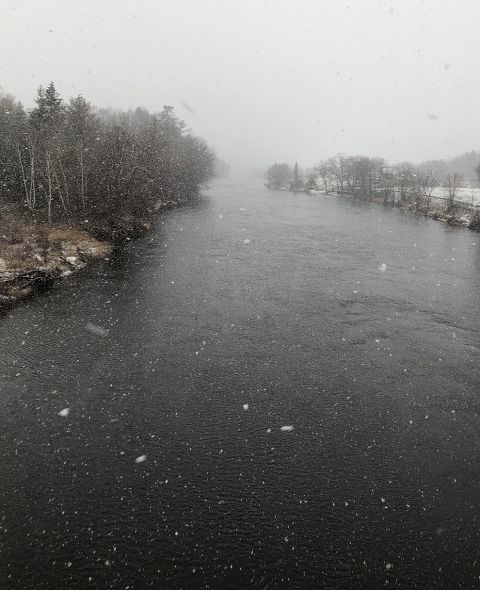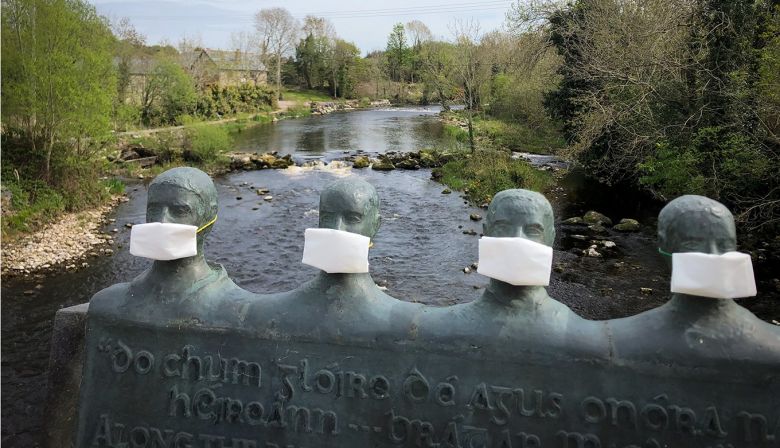
Subscribe & stay up-to-date with ASF


Closer to home, the section below on Newfoundland and Labrador details the DFO salmon management plan for the year, and the provincial government’s statement they will not be selling non-resident Atlantic salmon angling licences, at least not at this time. It may well be that the Atlantic salmon and many passionate and conservation-oriented anglers will need to “keep the faith” until 2021.
On research, there is progress being made. On the Miramichi, smoltwheels are being deployed, as are tracking receivers. Check the New Brunswick section for photos and details.
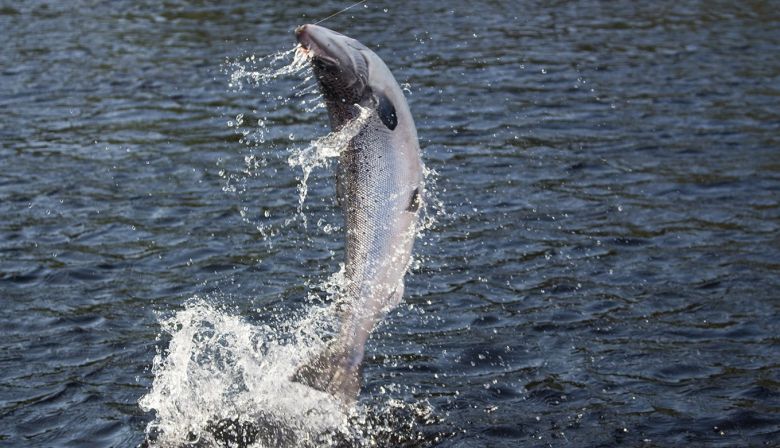
FISHERIES AND OCEANS CANADA
NOTICE TO ANGLERS
na.20.004B
2020-046
May 12, 2020
2020 Atlantic Salmon Recreational Fishery
DFO wishes to advise anglers that the 2020 season for the Atlantic Salmon recreational fishery are:
Insular Newfoundland – all rivers are open from June 1 to September 7, 2020.
Labrador – all rivers are open from June 15 to September 15, 2020.
Management measures for recreational salmon fishing in 2020 are as follows:
A retention limit of one fish on Class 2 rivers (Tag 1 – red) and a retention limit of two fish on Class 4, Class 6 and unclassified rivers (Tags 3 and 4 – green).
A catch and release limit of three fish per day for all rivers in Newfoundland and Labrador with the exception of Class 0 rivers. On Class 0 rivers anglers are permitted to catch and release a limit of two fish per day.
The retention of salmon on non-scheduled waters is not permitted.
The continuation of the 2019 multi-faceted Environmental Protocol which will be available in the 2020-2021 Angler’s Guide.
For additional information, refer to the Fisheries Management Decision online at:
http://www.dfo-mpo.gc.ca/fisheries-peches/decisions/fm-2020-gp/index-atl-eng.html
On the regulations pertaining to bag limits, river classification, closed areas and special management areas are contained in the 2020 – 2021 Angler’s Guide which will be available soon in booklet form or on-line at:
http://www.nfl.dfo-mpo.gc.ca/NL/AG/anglersguide
Regional Director General, Fisheries and Oceans Canada, Newfoundland and Labrador Region gives notice that Variation Order 2019-256 has been revoked and Variation Order 2020-046 comes into effect on May 13, 2020.
If you would like to have all “Notices to Anglers” for recreational fisheries sent directly to you by email please contact: beverly.piccott@dfo-mpo.gc.ca
DFO MAP 2019-2020 of Scheduled Rivers – (Check for any updates in upcoming 2020-2021 information):
http://www.nfl.dfo-mpo.gc.ca/folios/01019/docs/salmon-rivers-map-2019-2020-eng.pdf
NL Government Not Selling Non-Resident Salmon Angling Licenses
For the first in many decades, the provincial government will not be selling non-resident salmon angling licenses. Not surprising with the Covid-19 pandemic, but on another level, this is a province that has encouraged salmon anglers who “come from away” for more than 125 years.
Their press release also is worth reading in full, to also pick up detailed reminders on the rules of 2020:
Public Advisory: Provincial Government Announces Protocols for 2020 Angling Season
Newfoundland and Labrador Fisheries and Land Resources
May 12, 2020
Fisheries and Land Resources is reminding anglers to follow public health guidelines for all COVID-19 alert levels during the upcoming salmon angling season, which opens June 1 and closes October 7.
Salmon licences will still be available at retail vendors such as gas stations, convenience stores, and major chain stores. Anglers are not required to sign licences in-store upon purchase as usual, but must sign their licences before going onto rivers for the licence to be valid. Anglers who usually purchase licences from outdoor and sporting goods stores that are closed due to COVID-19 restrictions should check whether those stores offer contactless sales options. Online purchasing is not available.
Due to the Chief Medical Officer of Health’s current ban on non-essential travel to Newfoundland and Labrador, the department will not be issuing non-resident licences until further notice.
Outdoor recreational activities are important for the well-being and enjoyment of residents – approximately 110,000 residents of Newfoundland and Labrador participate in inland fishing activities across all species, the highest participation rate in Atlantic Canada.
To lower the risks associated with COVID-19 and to complement public health guidance for all alert levels, the Department of Fisheries and Land Resources will encourage anglers to:

As May 15 is on Friday, and the first river, the Causapscal, is normally open, there are still many questions that do not have answers that weigh heavily on what the 2020 season is going to look like.
Patience and understanding is required in 2020. The people tasked to manage sport fishing on our salmon rivers are coping and adhering to Covid-19 protocols in the best way possible. With the situation and guidelines in a constant state of flux, anglers are being asked not to cancel any reservations for the time being.
Pursuant to this situation, cancellation and refund policies are being relaxed. For a refund, please contact the manager of your destination river at least seven days prior to your fishing dates if you will not be able to travel due to governmental restrictions linked to Covid-19.
In general terms, usual cancelation and refund policies remain if reasons given are not related to Covid-19 restrictions.
De nombreuses questions n’ont toujours pas de réponses qui pèsent lourdement à quoi ressemblera la saison 2020 à l’approche du 15 mai.
La patience deviendra une vertu dans le cadre de cette nouvelle normalité. Les personnes attitrées de gérer la pêche sportive sur nos belles rivières font face et adhèrent aux protocoles Covid-19 au meilleur de leurs capacités.
Les pêcheurs sont priés de ne pas annuler de réservation pour le moment parce que les directives et la situation sont en évolution constante.
En raison de cette situation, les politiques d’annulation et de remboursement sont assouplies. Si vous devez annuler, contacter le gestionnaire de votre rivière de destination au moins 7 jours avant vos dates de pêche afin d’être remboursées, si vous ne pouvez pas voyager en raison des restrictions de déplacement gouvernementales liées à Covid-19.
Si les raisons invoquées pour une annulation ne sont pas liées aux restrictions de la Covid-19, les politiques habituelles d’annulation et de remboursement demeurent en vigueur
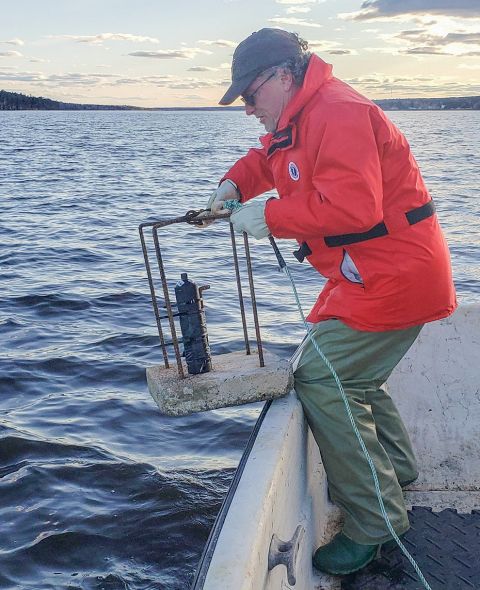
Evan Carr describes the fieldwork:
After a frustrating start with a broken axle on our Boston Whaler trailer, we had a window of opportunity to launch the boat in Nelson, Miramichi to deploy the first round of receivers in the estuary.
We continue to deploy the acoustic tracking receivers this week throughout the Miramichi system. The Miramichi Salmon Association (MSA) has deployed smoltwheels in the Little Southwest and Northwest Miramichi and began monitoring the traps at the beginning of this week.
International Paper began monitoring the Rocky Brook smoltwheel this week as well.
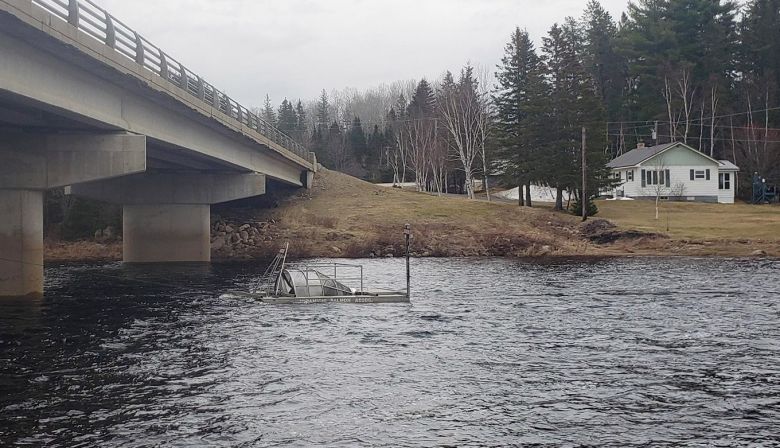
Tom Moffatt adds:
This smolt tagging research has brought many insights through the years. Each river has a different profile of survival in the river, estuary and at sea. In the case of the Miramichi, the issue of striped bass predation in the lower river arose after ASF already had several years data. With a massive increase of the striped bass spawning in the lower Miramichi, the data has shown clearly that predation by the bass is significantly impacting the numbers of Atlantic salmon smolt surviving to reach the open ocean. The estuary is a gauntlet of death for them.
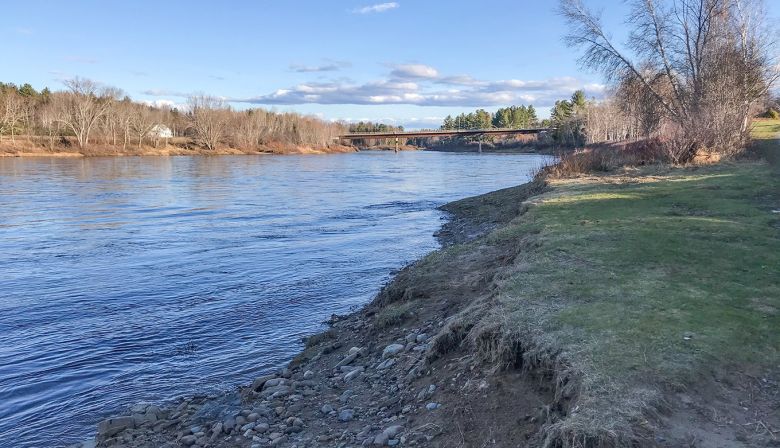
Brock Curtis of Blackville says:
This past Saturday brought approximately 15 cm. of snow in the Blackville area. By Monday it had mostly melted. I checked the river levels Monday evening and they couldn’t be better for salmon fishing, especially out of a boat. We have been talking to a couple of unemployed guides and other locals who were hooking into both salmon and trout Sunday and Monday. The fishing is still pretty good. Striped bass are moving further upstream now on both branches of the Miramichi. We heard they are in the Quarryville area but not 100 per cent sure on that. We will be able to verify this in a few days.
More restrictions were lifted last Friday here in NB and it allowed businesses like our tackle shop to open.
We have to provide protection but other than that the guys seem to be thankful to be able to pick up gear and get on the river.
We are a smaller operation and unlike the big box stores most of our customers are commenting that they feel safer coming to a smaller more personal business. We do miss our customers Internationally especially from the United States.
Salmon fisherman are a unique breed, and though we are a smaller group in the overall angling community. this tends to bring us closer together and we really miss the friendships developed over the years.
This is a very unusual season for the angling industry. At this time most of our lodges which normally would be in full operation are sitting with few bookings, while guides, cooks, caretakers, cleaners, etc are unemployed. There is a lot of uncertainty for those who are normally employed in this sector of the tourism industry.
The season is slowly slipping by and how we adapt is yet to be seen. I am sure we will never forget Covid-19 and the 2020 angling season.
For N.B residents this summer would be a good time to book one of our Miramichi lodges and fish salmon on prime waters. I cain’t think of a better way to experience the heritage and culture of a world class salmon fishing river.
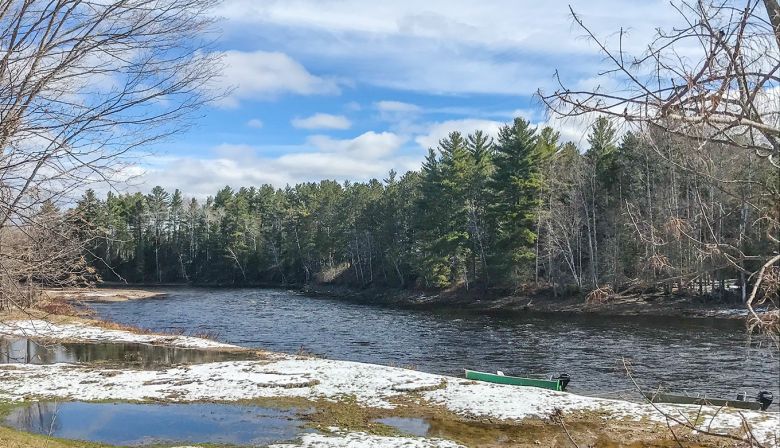
Last week, whenever conditions were appropriate on the river, we were catching salmon. But then, there were days when the water was high, with a lot of silt.
With the change in NB rules on the pandemic, we are able to operate now, as long as we abide by the procedures. As outfitters, we all need to have our plan in place for social distancing, cleaning surfaces, etc. Even light switches and taps need to be wiped down, of course. But we are open – and have some business. Miss our U.S. friends, of course.
We are doing day adventures and for day-based fishing the boats, motors and guides are ready. And certrainly for New Brunswickers, this is a great opportunity to get out there, on the river.
This week the river conditions are perfect, great levels and excellent clarity.
Striped bass are present below Miramichi City, and we expect them further up the river as the temperatures rise.
For the summer and fall ahead, we just cannot predict what will happen. But we are able to expand the operation, if the opportunity is there.
Greg Lovely
writes:I had been fishing the Bras d’or lakes. but Whycocomagh Bay has now partially closed. The reason I say “had” is because there are still many people over there ignoring the DFO variation order. Quite frankly, that aggravates, and I am afraid that attitude of ignoring the rules will spill over to the Margaree when the salmon season opens up June 1.
The water levels have settled and the river is running clear and I have heard of some dandy sea run brook trout and brown trout being hooked down river.
It is now two weeks before the salmon season starts and you cannot buy a salmon license yet. It will be interesting to see what the recreational salmon season will look like for 2020.
Greg also notes:
Our Margaree Salmon Association Spring newsletter was just released. On the front cover is a large and extremely healthy female kelt, one of approximately 50 that were
caught and released looking for tags as part of our marked kelt recapture project for DFO.
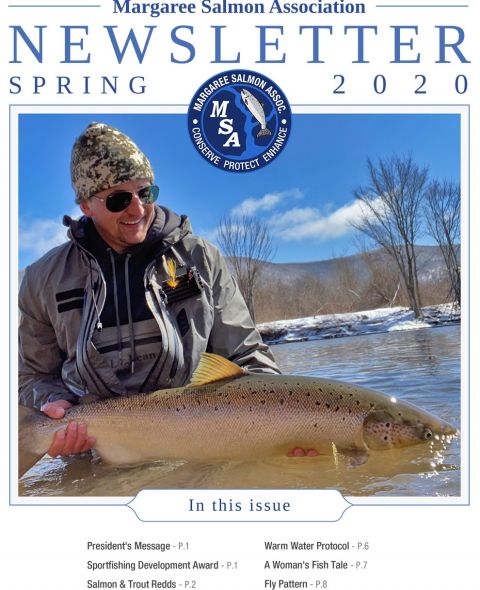

Here we had just started to enjoy some good fishing following a prolonged spring flood when the country went into lockdown and fishing was suspended on the 24th of March.
Since then only anglers who live within 2 km of the river have been permitted to fish. This distance restriction has been increased to 5 km this week and will increase to 20 km next month before travel restrictions are removed entirely on July 20, at which time non-essential retail stores such as fishing tackle shops will be allowed to reopen.
The lockdown period has been almost completely dry, and water levels are now at very low summer levels. Due to this there are practically no anglers out.
The spring run had started slowly this season but there were signs of good runs of springers before the lockdown.
Smolts this year appear to be smaller than usual from what I have seen.
We are now starting to see the first of the grilse arriving. Hopefully we will get some much needed rain and a rise in water levels before fishing resumes.

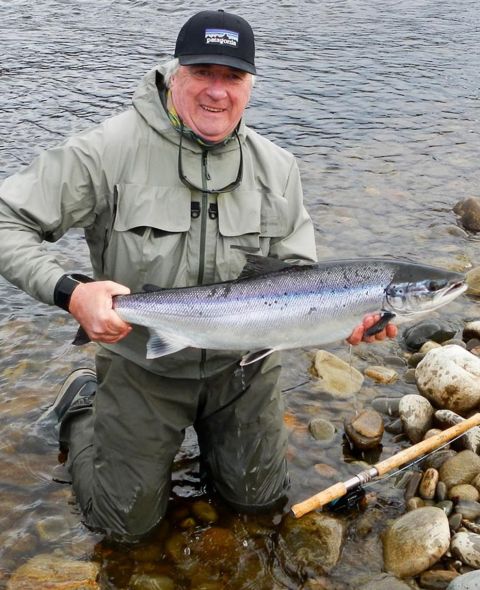
Here is what he said this week:
Scotland has been “locked down” due to Covid-19 since March 23 and remains so, possibly for a few weeks yet. Everyone is obliged to stay at home and work from home if possible except for those doing essential work or for daily outdoor exercise (locally walking, running or cycling) or shopping for essentials with 2-metre social distancing required except where it cannot be achieved indoors and then face coverings are recommended. Most businesses, shops, hotels etc. are closed, non-essential travel is banned.
All fishing ceased at the beginning of lock down and so the estimates that I’m giving are based on reported catches only up to that time.
As you know some of our rivers open in January or early February so many of then got several weeks of fishing before they were forced to close.
During early season fishing is very much dominated by weather conditions which can make it impossible at times so its difficult to accurately compare during early weeks on a year to year basis. Like many countries the trend here is that of diminishing runs of Atlantic Salmon and nothing in the reported catches suggests that 2020 is in any way bucking the trend because over the early weeks of the season they were lower than usual.
Returns for the River Dee look to be slightly more than 50 per cent of last year’s figure and about 33 per cent of the five-year average number. The River Tweed was very poor in February, probably less than 20% of the five-year average but the March catches appeared to be heading for a similar total to last year’s figure at about 45 per cent of the five-year average.
On the River Tay system the figure at the close of play was about 40 per cent of last year’s average and 20 per cent of the five-year average. The salmon counter at Pitlochry Dam on the River Tummel which is the Tay’s main tributary gives another indication of abundance although again the vagaries of water level and temperature can affect the timing of salmon ascending the fish ladder. At present around 200 salmon have been counted. Last year’s figure at this time was in excess of 300 and the final figure of 1,671 was the lowest on record but it’s too early to read much into this meantime.
Had we been able to fish. the picture might indeed have been quite different, perhaps there are more fish in the rivers this year and the good news for the fish anyway is that they are being allowed to continue their sojourn unmolested by anglers. So I can’t decide whether I’m more disappointed by missing fishing or by going fishing and being disappointed by the result, but I’m still looking forward to casting a line again when it’s safe to indulge.
As for my fishing, I try to avoid flogging a dead horse these days and was just getting ready to start fishing when lock-down occurred so I’ve yet to wet a line this year. .
Tight line when possible and stay safe!
